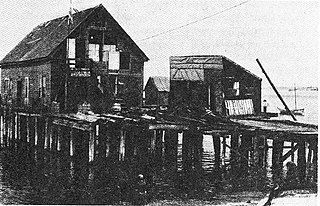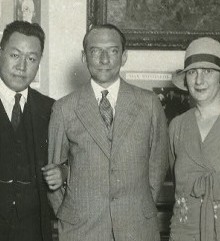Makers of Light
Makers of Light is a drama copyrighted by Day in 1920 and published in 1925. It was first shown at the Agassiz House Theater in Cambridge Nov. 25, 1921. The cast consisted of F.C. Packard, Jr., Angela Morris, Edith Coburn Noyes, Dorothy Sands, Oviatt McConnell, Henry Carlton, James Daly, F.L. Strong, Norman Clark, E.P. Goodnow and Robert Bushnell. It opened at the Neighborhood Playhouse of New York City, the Little Theater of Cleveland and the Play House of Cleveland.
"Makers of Light, when originally produced by the 47 Workshop made so deep an impression that later it was played at the Neighborhood Playhouse, New York City. Here it was again praised for its sincerity, subtle characterization of the chief figures and its power. Given at the Little Theater, Clevland, in the winter of 1924, it was revived the following autumn." -Professor George P. Barker
The dedication to the Makers of Light reads, "To my father; For his affection in spite of disapproval, his loyalty in spite of disbelief."

Daniel Chester French was an American sculptor of the late nineteenth and early twentieth centuries, best known for his 1874 sculpture The Minute Man in Concord, Massachusetts, and his 1920 monumental statue of Abraham Lincoln in the Lincoln Memorial in Washington, D.C.
In American theater, summer-stock theater is a theater that presents stage productions only in the summer. The name combines the season with the tradition of staging shows by a resident company, reusing stock scenery and costumes. Summer stock theaters frequently take advantage of seasonal weather by having their productions outdoors or under tents set up temporarily for their use.

The Shubert Organization is a theatrical producing organization and a major owner of theatres based in Manhattan, New York City. It was founded by the three Shubert brothers in the late 19th century. They steadily expanded, owning many theaters in New York and across the country. Since then it has gone through changes of ownership, but is still a major theater chain.

Brighton is a former town and current neighborhood of Boston, Massachusetts, United States, located in the northwestern corner of the city. It is named after the English city of Brighton. Initially Brighton was part of Cambridge, and known as "Little Cambridge". Brighton separated from Cambridge in 1807 after a bridge dispute, and was annexed to Boston in 1874. For much of its early history, it was a rural town with a significant commercial center at its eastern end.

Thomas White Lamb was a Scottish-born, American architect. He was one of the foremost designers of theaters and cinemas in the 20th century.
Cleveland Play House (CPH) is a professional regional theater company located in Cleveland, Ohio. It was founded in 1915 and built its own noted theater complex in 1927. Currently the company performs at the Allen Theatre in Playhouse Square where it has been based since 2011.

Karamu House in the Fairfax neighborhood on the east side of Cleveland, Ohio, United States, is the oldest African-American theater in the United States opening in 1915. Many of Langston Hughes's plays were developed and premièred at the theater.

Playhouse Square is a theater district in downtown Cleveland, Ohio, United States. It is the largest performing arts center in the US outside of New York City. Constructed in a span of 19 months in the early 1920s, the theaters were subsequently closed down, but were revived through a grassroots effort. Their renovation and reopening helped usher in a new era of downtown revitalization in Cleveland, and was called "one of the top ten successes in Cleveland history."

The Provincetown Players was a collective of artists, writers, intellectuals, and amateur theater enthusiasts. Under the leadership of the husband and wife team of George Cram “Jig” Cook and Susan Glaspell from Iowa, the Players produced two seasons in Provincetown, Massachusetts and six seasons in New York City, between 1916 and 1922. The company's founding has been called "the most important innovative moment in American theatre." Its productions helped launch the careers of Eugene O'Neill and Susan Glaspell, and ushered American theatre into the Modern era.

Madge Kennedy was a stage, film and TV actress whose career began as a stage actress in 1912 and flourished in motion pictures during the silent film era. In 1921, journalist Heywood Broun described her as "the best farce actress in New York".

Edythe Chapman was an American stage and silent film actress.

Helen Jerome Eddy was a motion picture actress from New York City. She was noted as a character actress who played genteel heroines in films such as Rebecca of Sunnybrook Farm (1917).
As the new medium of cinema was beginning to replace theater as a source of large-scale spectacle, the Little Theatre Movement developed in the United States around 1912. The Little Theatre Movement served to provide experimental centers for the dramatic arts, free from the standard production mechanisms used in prominent commercial theaters. In several large cities, beginning with Chicago, Boston, Seattle, and Detroit, companies formed to produce more intimate, non-commercial, non-profit-centered, and reform-minded entertainments.
Robert Joseph Litz was an American playwright, screenwriter, director and critic.
Frederic Chapin was an American screenwriter and composer. His name was also written as Frederick Chapin. He wrote the scores for several Broadway musicals. In addition he worked writing screenplays during the silent and early sound eras.
Jean-Claude van Itallie was a Belgian-born American playwright, performer, and theatre workshop teacher. He is best known for his 1966 anti-Vietnam War play America Hurrah;The Serpent, an ensemble play he wrote with Joseph Chaikin's Open Theatre; his theatrical adaptation of the Tibetan Book of the Dead; and his translations of Anton Chekhov's plays.
The Buffalo Players were a community theater group operating in Buffalo, NY from 1922 to 1926. Although only in operation for four years, they were connected with several prominent theater and film professionals, such as C. Pascal Franchot ; Marian de Forest, founder of Zonta International and Buffalo civic leader; and Broadway and Hollywood actor Jerome Collamore.

F. Ray Comstock was an American theatrical producer and theater operator. He pioneered the intimate musical comedy, staging several successful comedies at his Princess Theatre in Manhattan. He also produced spectacular musicals, variety shows and serious plays by authors such as Henrik Ibsen and Maxim Gorky.

Frederic Stewart Isham was an American novelist and playwright who wrote mainly historical romances and adventure novels.











